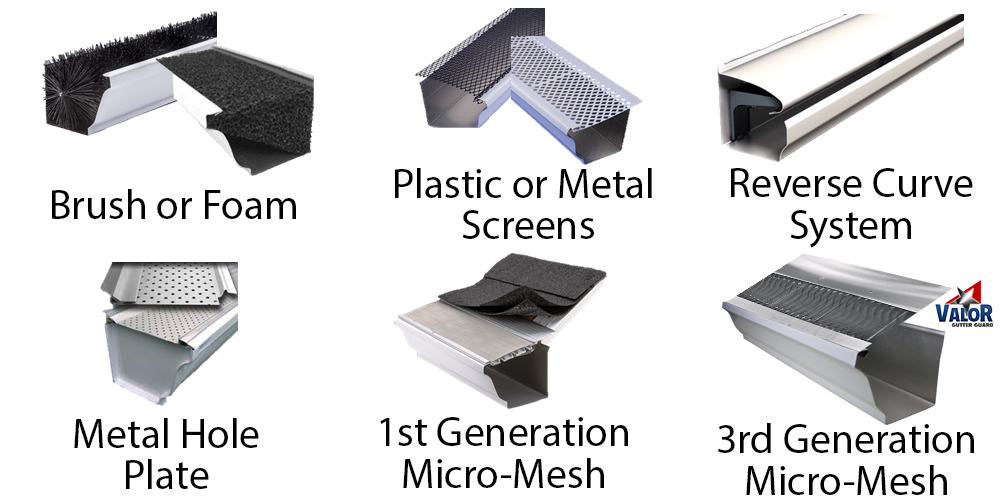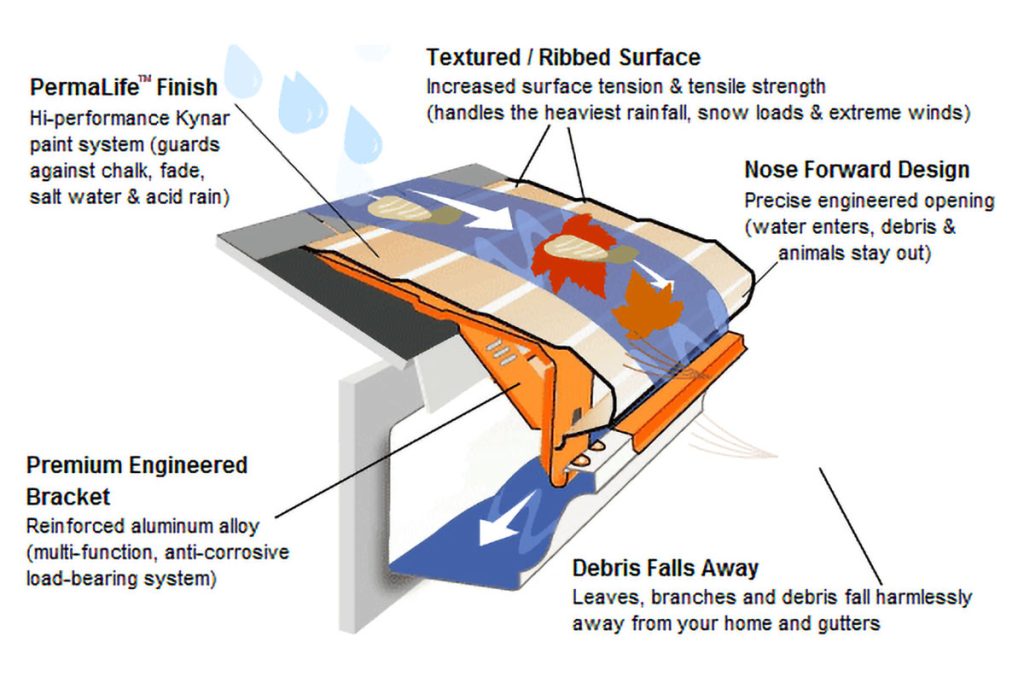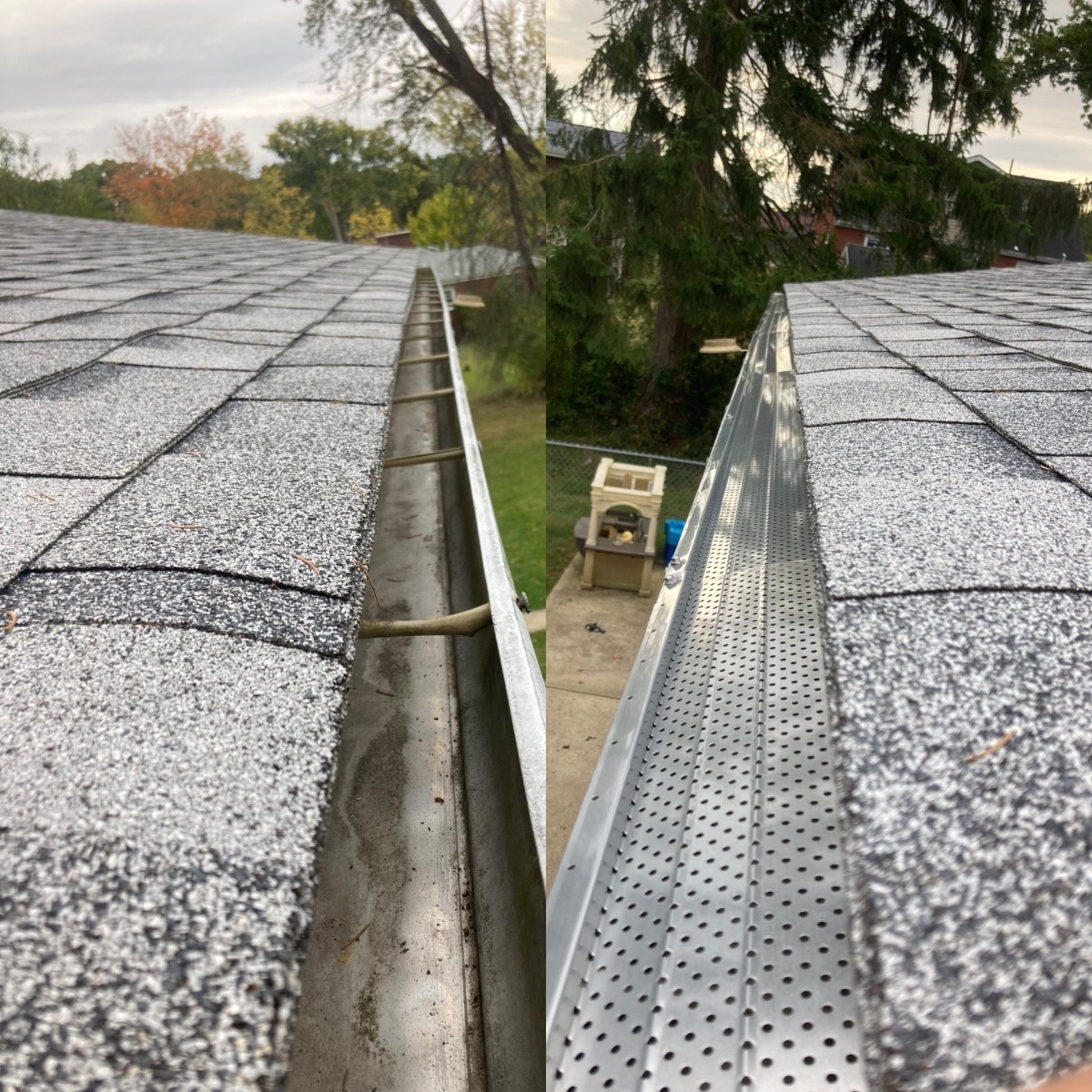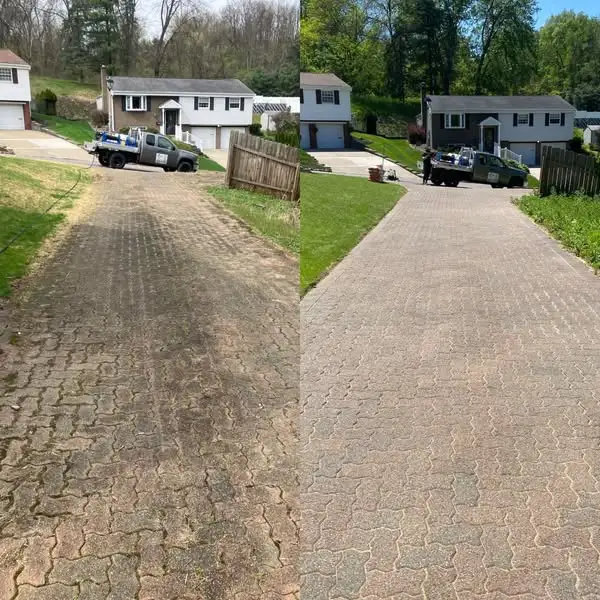There are many types of gutter guards on the market, and choosing which to use can be a doozy.

In this article we’ll go over which works best, lasts longest, installation, and our recommendation.
Brush/Foam
These are often sold at department stores and generally do a pretty good job, for about a year or two. The main problem we’ve found with these is small debris gets trapped in them and renders them useless after a couple years. Furthermore the foam will deteriorate after a while and debris will get inside and clog your gutters.
This is a good option if:
a. You have easy access to your gutters and a ladder
b. You’re willing to risk it in the ladder/roof
c. You’re willing to replace them every couple years
This being said, we never recommend these as you will waste far more time, money, and effort than opting for professional installation
Plastic or Metal Screens
These are a step up from the Brush/Foam, but have their drawbacks. Being that they simply clip into the lip of the gutter, not secured via screws. Some may be secured under the shingle, but this isn’t a good long term solution as they will eventually come loose.

We’ve encountered this many times before, where the clip in plastic guards come off/clog up, leading to clogged gutters and wasted guards
While these might look like an effective option, we find these are the most common to come off and need replaced.
Metal mesh are a much better option than plastic, but are also prone to clogging and coming loose
These things considered, these are another budget friendly option, but you will pay in the long term as they will need cleaned/replaced every so often.
Reverse Curve System
If you’ve researched gutter guards before, you’ve probably stumbled across companies like Gutter Helmet, who use a system similar to this.

This, or something similar, is often times the demonstration companies who install these will use
This is a very deceiving image, as it looks like this works flawlessly. Unfortunately, this isn’t the case
This image accounts for a very small amount of water flowing down the roof. While this might be very effective at keeping out the debris, any more than a trickle of rain and the water goes right over the guard and on to the ground below
Last we checked the purpose of gutters is to catch the water and re-direct it down the downspout, so for guards that defeat that purpose? Highly don’t recommend.
Metal Hole Plate
Now we’re getting to the good stuff. This is the favorite of CC Pressure Washing and most of the companies I’ve talked to.

This is a job we did and the homeowner chose to have guards installed. As you can see, it came out pretty well. We’ve been using these since the beginning of CCPW, and I’m close with a landlord who swears by these and has been using them for 20+ years, without a clog.
These are effective at allowing proper water flow, keeping debris out of the gutters, and not clogging.
This being said we highly recommend these, and if you’re not in the Pittsburgh area and can’t use us, try to find a company that does, as these won’t disappoint
Mesh/Micro Mesh
This is an easy second place for us. Large companies such as Leaf Guard use this style, and while it is very effective, it does have its drawbacks.
The tight meshes are extremely effective as keeping debris out, which one would think to be a good thing, but not always! This thin mesh allows nothing to pash through, and as a result very small particles will get trapped and, after some time, will clog up.
This is why we’re such a fan of the metal hole plate: Small particles are allowed to move through and down the gutters, but such small debris will never be able to cause a clog and will simply go down the downspout.
DIY vs Professional Installation
One option when it comes to installing guards is going to your local Home Depot, picking up whatever’s cheapest, and slapping them onto your gutters. Most department stores sport foam inserts or plastic/metal screens. We’ve done countless jobs where the first thing we did was remove half-removed plastic gutter guards that were installed less than a year or two ago.
While this is an inexpensive option, most things from your local department store will last less than a couple years, even if you opt for a metal version. Furthermore, you’ll have to instal these yourself, which requires risking it on the ladder or roof.
DIY can be a good option if you have low gutters, a ladder to access them, and not to many deciduous trees overhead. Any more than a couple small trees and the department store defenders will clog up in no time.
This being said, 9 times out of 10 we recommend professional installation. Is that coming from a company that does professional installation? Yes, but here’s why we say that.
- While we can’t speak for other companies, we use the metal hole plate style and have had properties with these guards for 20+ years without a clog
- Professionally installed guards often come with a warranty and will last for the life of your gutters
- They will be much higher quality than the Home Depot heros, which means they last longer, do a better job, and won’t pop off in a bad storm
- Someone else’s problem! This means no worries about injuring yourself on the ladder/roof, not having to worry about choosing the right guards, and an all around smooth process (Most of the time)
Conclusion
Here’s our ranking, best to worst:
- Metal Hole Plate
- Mesh/Micro Mesh
- Plastic/Metal Screen
- Brush/Foam
- Reverse Curve System
So if it’s in the budget, we recommend reaching out to a professional company and having gutter guards installed. Be sure to ask what style they use, and if it isn’t a variation of the metal hole plate or mesh style, find someone who does
If you’re in the Pittsburgh area and are interested in gutter guards, gutter cleaning, or pressure washing, feel free to request a quote or reach out another way


